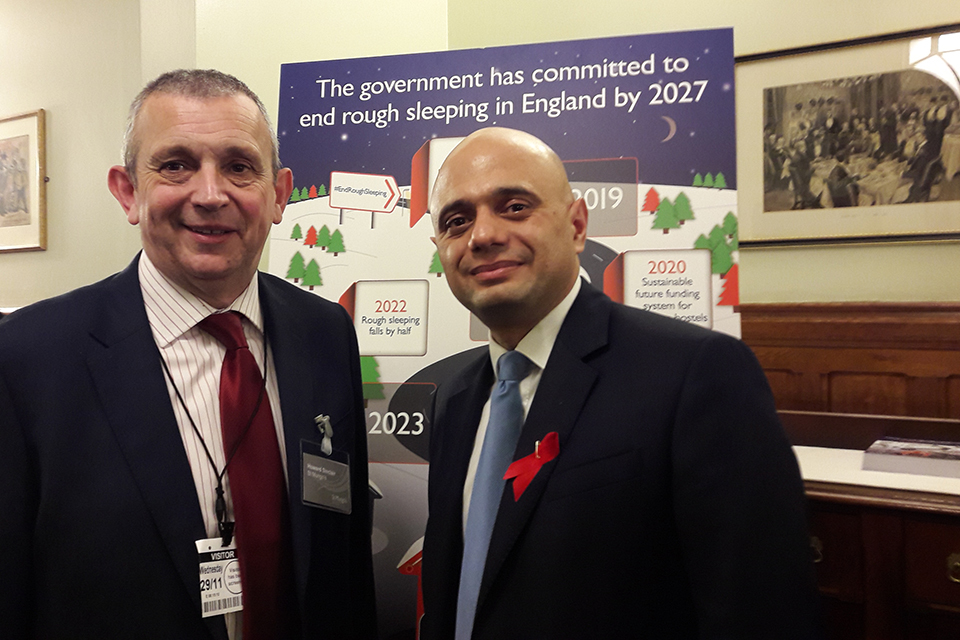Government to lead national effort to end rough sleeping
Sajid Javid sets out details of a new Rough Sleeping Advisory Panel that will help develop a national strategy.

Homelessness
Communities Secretary Sajid Javid has today (30 November 2017) set out details of a new Rough Sleeping Advisory Panel that will help develop a national strategy as part of the government’s commitment to halve rough sleeping by 2022 and eliminate it altogether by 2027.
This new Advisory Panel made up of homelessness experts, charities and local government, will support the Ministerial Taskforce, which brings together ministers from key departments to provide a cross-government approach to preventing rough sleeping and homelessness.
Members of the Rough Sleeping Advisory Panel include:
- Jon Sparkes, chief executive of Crisis, a leading charity focussed on rough sleeping and single homelessness
- Polly Neate, chief executive of homelessness charity Shelter, who brings her expertise on domestic abuse as a driver of homelessness
- Jean Templeton, chief executive St Basil’s, a West Midlands based charity that helps 16 to 25 year olds who are homeless or at risk of homelessness
- Mark Lloyd from the Local Government Association
- Mayors for Manchester Andy Burnham and for the West Midlands Andy Street
- Peter Fredriksson, a homelessness advisor to the Finnish government, which has successfully piloted the Housing First approach
This latest action builds on the work government is already doing including:
- spending over £1 billion until 2020 to tackle homelessness and rough sleeping
- implementing the Homelessness Reduction Act which will make sure more people get the help they need to prevent them from becoming homelessness in the first place
- £28 million of funding to pilot the Housing First approach for entrenched rough sleepers in the West Midlands Combined Authority, Greater Manchester, and the Liverpool City Region
- investing £9 billion by March 2021 to build new affordable homes
- a £20 million scheme to support homeless people and those of risk of homelessness secure homes in the private rented sector
The Homelessness and Rough Sleeping Implementation Taskforce will be chaired by the Communities Secretary Sajid Javid.
Communities Secretary Sajid Javid said:
No one should ever have to sleep rough. That’s why this government is committed to halving rough sleeping by 2022 and eliminating it altogether by 2027.
To break the homelessness cycle once and for all, we all need to work together, drawing on as much expertise and experience as we can. The Homelessness and Rough Sleeping Implementation Taskforce and the Rough Sleeping Advisory Panel, together with the 3 Housing First pilots, are important steps in making that happen.
The Advisory Panel supporting the Taskforce will be chaired by the Homelessness Minister Marcus Jones.
Homelessness Minister Marcus Jones said:
The Rough Sleeping Advisory Panel brings together experts with both the knowledge and determination to reduce homelessness and end rough sleeping.
Working together with the charities and local authorities who have already achieved so much, we can fulfil our joint ambition to make sure we help some of the most vulnerable in society.
The government is committed to reducing homelessness and rough sleeping, and making sure that individuals and families are provided with the support they need as early as possible. It is already spending over £1 billion until 2020 to tackle homelessness and rough sleeping.

St Mungo CEO
Sajid Javid meets Howard Sinclair, chief executive of St Mungo’s
Housing First
Communities Secretary Sajid Javid will take forward the implementation of the 3 Housing First pilots for which the Budget confirmed the £28 million funding. The minister first saw the Housing First scheme on a fact finding trip to Finland.
The pilots in Greater Manchester, the Liverpool City Region and the West Midlands Combined Authority will support the most entrenched rough sleepers get off the streets and help them to end their homelessness. Individuals will be provided with stable, affordable accommodation and intensive wrap-around support. This will help them to recover from complex health issues, for example substance abuse and mental health difficulties and sustain their tenancies.
Also announced in the Budget is a new £20 million fund to support homeless people and those at risk of homelessness secure homes in the private rented sector.
Access to the private rented sector plays a part in both preventing and supporting the recovery from homelessness, helping people rebuild their lives. This fund could support bids for social lettings agencies, guaranteed deposit schemes or tenancy sustainment schemes. The department is keen to encourage bespoke, innovative solutions that reflect local need.
Further information
Rough Sleeping Advisory Panel members
Chairman
- Marcus Jones, Parliamentary Under-Secretary of State for Communities and Local Government / Homelessness Minister.
Charity sector
- Jon Sparkes, CEO of Crisis
- Polly Neate, CEO of Shelter
- Jeremy Swain, CEO of Thames Reach
- Howard Sinclair, CEO of St Mungo’s
- Jean Templeton, chief executive of St Basils
- Rick Henderson, chief executive, Homeless Link
Local government and mayors
- Andy Street, Mayor for West Midlands
- Andy Burnham, Mayor for Greater Manchester
- James Murray, London Deputy Mayor for London Housing and Residential Development
- Mark Lloyd, chief executive, Local Government Association
Housing sector
- David Orr, chief executive of the National Housing Federation which is a trade association for member social housing providers in England. International expert
- Peter Fredriksson, former advisor to the Finnish government on Homelessness and Housing First
Invitations may also be issued to other individuals to ensure the advisory panel can offer the most relevant advice across a wide range of issues.
Government action to date on tackling homelessness and rough sleeping
-
Spending over £1 billion until 2020 to tackle homelessness and rough sleeping, part of which is our £50 million Homelessness Prevention Programme to deliver an ‘end-to-end’ approach to homelessness and rough sleeping prevention.
-
Implementing the Homelessness Reduction Act. The Act will significantly reform England’s homelessness legislation, ensuring that more people get the help they need to prevent them from becoming homelessness in the first place. The Act also ensures that other local services refer those either homeless or at risk of being homeless to local authority housing teams.
-
Investing £9 billion by March 2021 to build new affordable homes. This government is committed to fixing the broken housing market and our Housing White Paper sets out measures to do just that.
-
£28 million funding to pilot the Housing First approach for entrenched rough sleepers in the West Midlands Combined Authority, Greater Manchester, and the Liverpool City Region.
New research into the causes of homelessness and rough sleeping
-
The Department for Communities and Local Government will be commissioning a feasibility study which will explore whether it is possible to carry out robust and useful research on a complex issue such as the causes of homelessness.
-
Ministers have already confirmed plans to overhaul homelessness data to make sure we have a better picture of the homelessness challenge. As part of the implementation of the Homelessness Reduction Act, which requires councils to provide support much earlier to people at risk of becoming homeless, local authorities will collect a wider range of individual level data. This change from April 2018 will generate much richer data, helping both local and central government take the right action needed.
Office address and general enquiries
2 Marsham StreetLondon
SW1P 4DF
Contact form https://www.gov.uk/gui...
General enquiries: please use this number if you are a member of the public 030 3444 0000
If your enquiry is related to COVID-19 please check our guidance page first before you contact us - https://www.gov.uk/guidance/coronavirus-covid-19-guidance-for-local-government.
If you still need to contact us please use the contact form above to get in touch, because of coronavirus (COVID-19). If you send it by post it will not receive a reply within normal timescale.
Media enquiries
Email newsdesk@communities.gov.uk
Please use this number if you are a journalist wishing to speak to Press Office 0303 444 1209
Social media - MHCLG
Twitter - https://twitter.com/mhclg
Flickr - http://www.flickr.com/photos/mhclg
LinkedIn - http://www.linkedin.com/company/mhclg